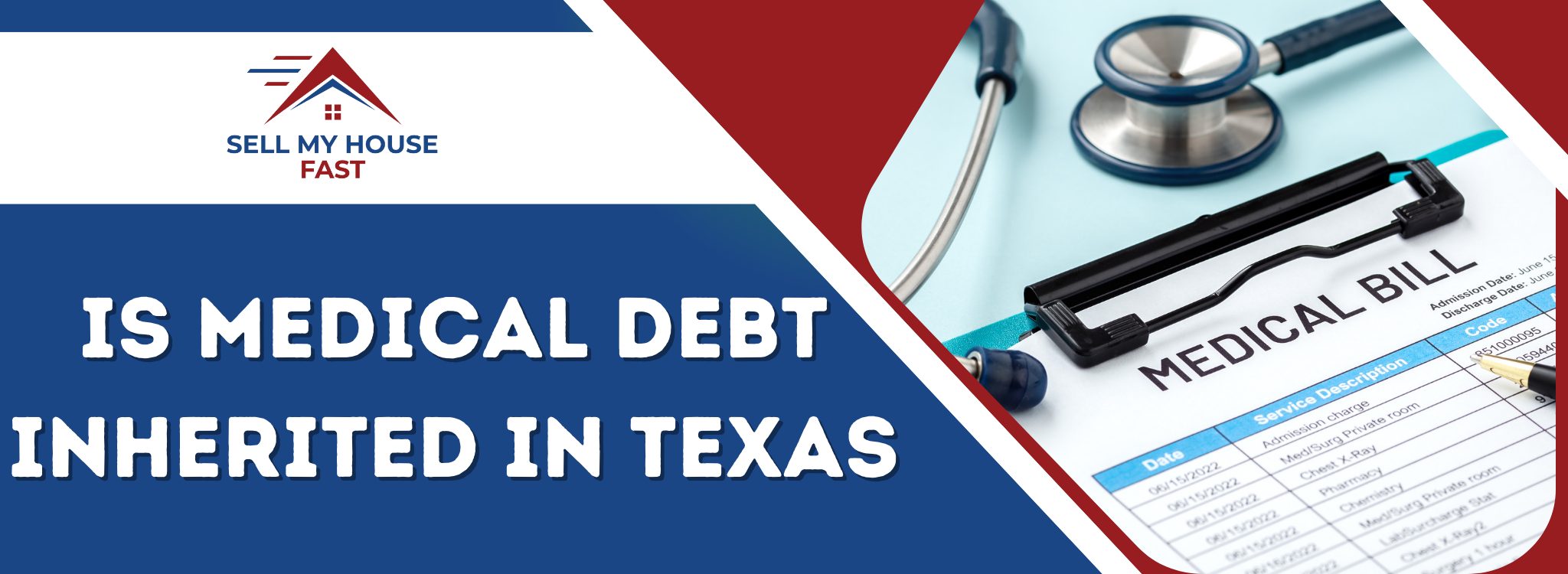
Understanding Medical Debt And Its Impact In Texas
Medical debt is a major concern for homeowners in Texas, affecting their financial stability. Understanding the complexities of inherited medical debt is critical for homeowners seeking to manage and address this issue effectively.
In Texas, medical debt can be passed down from parents to children, and it is critical to understand the legal implications of this practice. Furthermore, each state has its own set of laws and regulations governing medical debt, so homeowners must be aware of their rights and options.
With a thorough understanding of inherited medical debt in Texas, homeowners can navigate this complex issue and make informed decisions about managing their financial obligations.
The Legalities Of Inherited Medical Debt In Texas

When a loved one dies, their debts, including any medical debt, may be passed down to their heirs. In Texas, inherited medical debt can be complicated and overwhelming for homeowners.
Individuals are not responsible for repaying this debt, but it will be included in the deceased’s estate. This means that creditors can seek payment from the estate.
However, some exemptions and limitations exist to prevent homeowners from being burdened with excessive medical debt. When dealing with inherited medical debt in Texas, individuals should consult a probate and estate planning attorney to help them navigate the legalities and protect their rights.
Navigating The Complexities Of Medical Debt Inheritance Laws In Texas
For homeowners in Texas, the laws about inherited medical debt can be complicated and perplexing. Medical debts incurred by a deceased loved one do not simply go away; rather, they are assumed by their heirs.
Navigating this process, though, can be extremely difficult, particularly when grieving and in mourning. To prevent any unforeseen financial burdens, homeowners must be aware of the nuances of these inheritance laws.
There are several things to consider when handling inherited medical debt in Texas, ranging from figuring out which debts are inheritable to comprehending the statute of limitations. Homeowners can successfully navigate this process and safeguard against potential legal issues with the right information and direction.
How To Protect Your Family From Inheriting Medical Debt In Texas

Texas homeowners should be aware that they may inherit medical debt. Unpaid medical bills can result from a family member’s death.
You can take a few steps to protect your family from this burden. First, understand your loved one’s estate and any potential medical debt.
Communicating with creditors and healthcare providers is critical to ensure that all debts are paid before inheriting any assets. Consider buying life insurance or creating a trust to cover future medical expenses.
Being proactive and knowledgeable can help protect your family from inheriting medical debt in Texas.
Exploring The Link Between Estate Planning And Medical Debt In Texas
In Texas, estate planning is crucial in addressing inherited medical debt. When a homeowner dies, their medical debt becomes part of their estate, which can be passed down to their heirs.
Homeowners should understand how their medical debt will be handled after their death. Individuals who plan their estates properly can ensure that their loved ones are not burdened with unexpected medical expenses and that their assets are protected.
Texas homeowners can make informed decisions to protect themselves and their families from financial hardship by investigating the relationship between estate planning and medical debt.
Expose Common Misconceptions About Inherited Medical Debt In Texas

To make matters worse, many Texan homeowners have to figure out what to do with their inherited medical debt. Those struggling with this kind of debt may find themselves further confused and anxious due to a number of prevalent myths about the subject.
The common belief that inheriting medical debt makes you financially responsible for repayment is greatly exaggerated. Nevertheless, this is usually not the case.
Another common misunderstanding is that settling or negotiating inherited medical debt is impossible. This debt is no different from any other in that you can negotiate a reduced amount due.
Furthermore, many feel obligated to pay off a medical debt that a loved one has left behind by liquidating their own assets or selling inherited property. Although this is sometimes required, it is not necessarily the case in Texas.
To make well-informed decisions regarding inherited medical debt, homeowners should familiarize themselves with the facts.
The Importance Of Addressing Medical Debt Before It Becomes An Inheritance Issue
In Texas, homeowners must be aware of the potential inheritance issue of medical debt. Understanding how inherited medical debt works in Texas can help homeowners address the issue before it burdens their loved ones.
Medical debt can quickly accumulate and be passed down to family members, resulting in financial strain and potential legal complications. Homeowners must proactively manage and repay any outstanding medical debt before it becomes an inheritance problem.
By staying informed and taking action, homeowners can safeguard their assets and ensure a smooth transfer of wealth to their heirs.
Managing And Settling Outstanding Medical Debt In A Deceased Loved One’s Estate

Managing a loved one’s estate after death can be difficult and emotional. Any outstanding medical debt that was inherited is an important factor to consider.
In Texas, the laws governing inherited medical debt are complex and confusing. Understand your rights and responsibilities as a homeowner when managing and settling debt in a deceased loved one’s estate.
This includes understanding what medical debt can be inherited, how to negotiate with creditors, and what legal options exist for resolving outstanding balances. By educating yourself on these topics, you can protect your loved one’s legacy while avoiding financial burdens on yourself or your family.
Strategies For Minimizing The Impact Of Inherited Medical Debt On Your Finances
Having inherited medical debt can be a significant financial burden for Texas homeowners. However, some strategies can help you reduce its impact on your finances.
Negotiating with healthcare providers to reduce the debt owed is an effective strategy. Consider setting up a payment plan or applying for financial assistance.
It is critical to carefully review any bills or statements received and ensure that they are correct, as well as look for any potential billing errors. Consider consulting with a financial advisor or attorney specializing in inherited medical debt to discuss your options and create a personalized plan.
By taking these proactive steps, you can reduce the financial impact of inherited medical debt and achieve greater peace of mind.
The Role Of Medicaid And Medicare In Inherited Medical Debt In Texas

When it comes to understanding inherited medical debt in Texas, Medicaid and Medicare play an important role. These programs are crucial for providing healthcare coverage to low-income individuals and those with disabilities.
In the case of inherited medical debt, if the deceased person received Medicaid or Medicare benefits, their estate may be responsible for repaying any outstanding medical bills. This can significantly impact homeowners who inherit the debt because they may not have been aware of their responsibility and may struggle to cover these expenses.
Homeowners should review their loved ones’ healthcare coverage and consult with a financial advisor or attorney as needed.
Understanding The Rights And Responsibilities Of Heirs To Inherited Medical Debt
In Texas, homeowners who inherit medical debt from a deceased loved one may feel overwhelmed and uncertain about their rights and responsibilities. It is important to understand that as an heir, you are not automatically liable for the deceased’s medical debt.
However, if the estate has sufficient assets to cover the debt, it must be paid off before any inheritances are distributed. On the other hand, if there are insufficient assets to cover the debt, heirs are not legally required to pay it off with their own money.
Before making any decisions about inherited medical debt, you should carefully review all financial documents and consult with a lawyer to fully understand your rights and responsibilities.
How To Negotiate And Reduce Inherited Medical Debt In Texas

If you are a Texas homeowner and have inherited medical debt, you should know your options for negotiating and reducing it. First, make sure you have all the information you need. This includes the total amount owed, the original creditor’s name, and any pertinent insurance information.
The next step is to contact the doctor or hospital and ask about payment options or a reduced rate. A financial advisor or lawyer who focuses on inherited debt might also be useful to consult with.
Also, Texas law provides exceptions and safeguards for specific kinds of inherited debts; you should study these laws to leverage them in negotiations. Negotiating and reducing inherited medical debt in Texas can be challenging, but it can be managed with proactive planning and knowledge of your rights and options.
Preventing Creditors From Collecting On Inherited Medical Debts: Know Your Rights
In Texas, homeowners may find themselves burdened with inherited medical debt from a deceased family member. This can be a difficult and overwhelming situation, but individuals must understand their rights when preventing creditors from collecting on their debts.
Under Texas law, heirs are not legally responsible for repaying the deceased’s medical debts unless they co-sign or guarantee the debt. However, this does not imply that creditors will cease efforts to collect on these debts.
Homeowners must understand their rights and take the necessary precautions to protect themselves from potential harassment or unfair collection practices by creditors. By understanding the laws and regulations governing inherited medical debt in Texas, homeowners can better navigate this complex issue and avoid unnecessary financial stressors.
Exploring Alternatives To Passing Down Medical Debt To Heirs In Texas

Texas homeowners may inherit medical debt from deceased relatives. Medical debt can quickly mount and threaten the heirs’ finances, making this a difficult situation.
Texas homeowners have options for passing medical debt to their heirs. Medical providers and creditors may offer a reduced payment or settlement.
Another option is to limit debt transfer to heirs with a trust or estate plan. A financial advisor or attorney can also help manage inherited medical debt responsibly.
Homeowners can protect themselves and their heirs from inherited medical debt by exploring these options and understanding Texas law.
What Debts Are Forgiven At Death In Texas?
When a loved one dies, the last thing a family wants to think about is their debt. In Texas, certain debts, including medical debt, are automatically forgiven upon death.
This can provide comfort to grieving families who are concerned about inheriting large medical bills. However, homeowners must understand that not all medical debt is forgiven in Texas.
The deceased person’s estate must still pay off debts such as credit card debt and personal loans before any assets are distributed to the beneficiaries. Homeowners must be familiar with state laws governing inherited medical debt to properly plan and manage their finances.
What Happens If I Don’t Pay My Medical Bills In Texas?

If you are a Texas homeowner, you must understand the consequences of not paying your medical bills. Inherited medical debt can quickly accumulate and jeopardize your financial stability.
In Texas, medical debt is classified as unsecured, which means it is not secured by collateral. This means creditors cannot seize your property or assets if you do not pay your medical bills.
They can, however, take legal action against you by garnishing your wages or placing a lien on your property. Furthermore, failing to pay your medical bills can severely damage your credit score, making it difficult to obtain loans or mortgages in the future.
To avoid these consequences, it is critical to address inherited medical debt as soon as possible and explore payment options or negotiate with creditors.
Does Parents Medical Debt Get Passed Down?
Many Texas homeowners may be unfamiliar with the concept of inherited medical debt. One common question is whether a parent’s medical debt can be passed on to their children.
Yes, it can, but how much it affects children is determined by a variety of factors. Texas has no state law that automatically transfers medical debt to heirs.
However, if a parent names a child as a beneficiary or co-signer on a medical account, they may be held liable for any outstanding balances. Furthermore, if the parent’s estate still has assets after their death, creditors may use those assets to pay off any outstanding medical bills.
To avoid unexpected financial burdens, Texas homeowners must educate themselves on their rights and responsibilities regarding inherited medical debt.
Am I Responsible For My Husband’s Medical Bills After He Dies?
If you own a home in Texas, it’s critical to understand the laws regarding inherited medical debt. One common concern is whether a spouse is responsible for their partner’s medical bills after their death.
In Texas, this responsibility is determined by several factors, including whether the medical debt was incurred during the marriage and whether the spouse signed any financial agreements. If the debt is solely in your husband’s name and you have not signed any financial agreements, you are unlikely to be held liable for the medical bills.
However, if you co-signed or shared a joint account, you may be required to pay off the remaining balance. To fully understand your rights and responsibilities regarding inherited medical debt in Texas, you should carefully review any legal documents and, if necessary, seek the advice of an attorney.
These details apply to the entire state of Texas, including major cities like Houston, San Antonio, Dallas, Austin, Fort Worth, and Arlington, as well as their surrounding areas. If you require additional assistance or have specific questions, please do not hesitate to contact us at (281) 225-1729. Please visit our website at Sell My House Fast for more information and detailed descriptions of our services.


